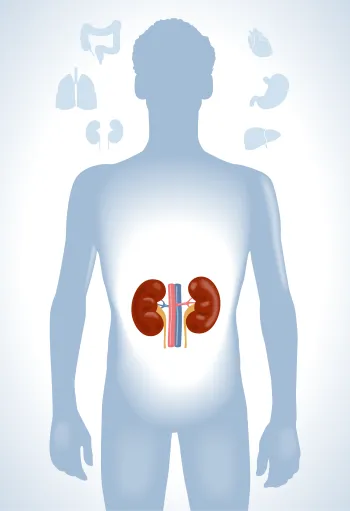
The kidneys are paired bean-like organs located in the back of the abdominal cavity in the retroperitoneum. The kidneys play a large role in the regulation of wastes, electrolytes, water, blood pressure and acid-base balance throughout the body. Although it is normal to have two kidneys, it is quite possible to live with just one.
The most common type of kidney cancer is called renal cell carcinoma (RCC). Risk factors include smoking, regular use of non-steroidal anti-inflammatories such as ibuprofen and naproxen, a family history of kidney cancer, and renal disease requiring dialysis.
Most commonly, kidney cancer is detected incidentally on imaging for some other purpose and has no signs or symptoms. In cases where the cancer has formed a larger tumor, a patient may experience flank pain, a mass in the abdomen, or blood in the urine that is either visable or apparent on a dipstick test. Other tests to help stage the extent of kidney cancer may include a CT scan of the abdomen and pelvis to help characterize the size of the tumor and parts of the kidney that are involved as well as to exclude any metastatic disease in the abdomen or pelvis. Additional tests may include a chest xray or chest CT scan to rule out any spread of cancer to the lungs. A bone scan to exclude spread to the bones may be done if there is a high suspicion that these structures may be involved. A biopsy may also be performed in certain cases to confirm a diagnosis of kidney cancer.
Kidney cancer is most often treated with surgery. This can involve removal of the entire kidney or removal of the mass and part of the kidney, to spare as much normal tissue as possible. Treatment can also involve heating the tumor with radiofrequency ablation or freezing the tumor with cryoablation. If the tumor mass is small of if the patient has significant comorbidities, the mass can be monitored with active surveillance. This involves periodically imaging the mass to see if it has grown and intervening if any progression is detected. Finally, there are medications that may help to shrink mass size and tumor burden, but these have side effects, so are reserved for more advanced or metastatic disease.













